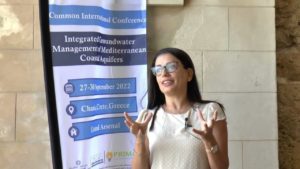At the time climate change is shaking up our society and complex challenges arise with managing scarce natural resources, FEMISE (the Euro-Mediterranean Forum of Institutes of Economic Sciences) and six other partners- the Royal Scientific Society in Jordan, the Tunisian Environmental Protection Agency, the Greek Centre for Renewable Energy Sources and Energy Savings, the Egyptian Centre for Innovation and Technological Development, University of Catania in Italy and the Autonomous University of Barcelona in Spain- have launched the WEF-CAP project.
This project has grasped an opportunity to efficiently capitalize Water-Energy-Food (WEF) Nexus best practices, commercialization tools and methodologies to promote cooperation and tech-transfer, mainstreaming policy impact for innovation-driven progress to effectively support education, research, technological advancement, and innovation in the EU-MPC region.
Meanwhile, sharing knowledge and innovative approaches have become even more urgent in the present economic crisis, when the basic economic resources are no longer confined to the availability of natural resources, or the amount of labor but rather the systematic modeling of knowledge and experts’ know-how for the purpose of growth and innovation.
To better streamline this knowledge, the project created a digital repository called WEF-CAP Observatory platform which is considered a regional leading informative site, that enable experts, researchers and policy-makers to share, diffuse and transfer knowledge of the WEF Nexus capitalization and generate technical insights on best methodologies, practices of water, energy and food integration. This open source hub includes a network of stakeholders to promote the use of existing data, case studies and good practices to support decision-making and the formulation of evidence-based policies
Within this context, FEMISE conducted a series of interviews with key players from the region, including practitioners, policy makers, private sector and academia to promote the WEF integrated approach under the framework of the WEF-CAP project with the financial support of the European Union through the ENI CBC MED Programme, with the aim to share knowledge, experiences and best practices across the region, highlight challenges and recommendations.
Capitalizing On WEF Initiatives That Work In France & Tunisia!
In this second episode, we present two innovative initiatives that have proven their worth and success, Stéphane Pouffary, Chief Executive Officer & Founder Honorary President at ENERGIES 2050, France working in the water and energy sector, and Prof. Hanene Akrout, Laboratory of wastewaters and Environment, at Centre of Water researches and Technology, Tunisia working on water management.


Aquapath Project, An Integrated & Sustainable Approach To Water Management
Over 12 years, Energies 2050″ has been committed to stand against climate change by bringing up members & Partners from 70 different countries where they implement and replicate innovative projects in the Mediterranean.
Aquapath,improves the economic and the environmental sustainability water management. The project aims to educate both stakeholders and consumers about the water carbon footprint throughout a validated set of scientific models and tools.
Reuelectrotex, An Innovative Concept of Water Wastes Recycling and Building Capacity of the Engineers and PHD Students
In Tunisia, REUELECTROTEX project aims to provide an effective solution to deliver an innovative concept of reuse and recycling wastewater to adjust to future climate impacts; a growing concern, among countries of the European Union. The project aims to the capacities of the engineers and PhD students to acquire innovative skills and synergy of experiences that open new future jobs.
Watch the video where we go beyond sharing relevant experiences. We promote effective WEF Nexus implementation practices that could be adequate for replications in the Mediterranean region to ensure access to water, energy and food for all.

